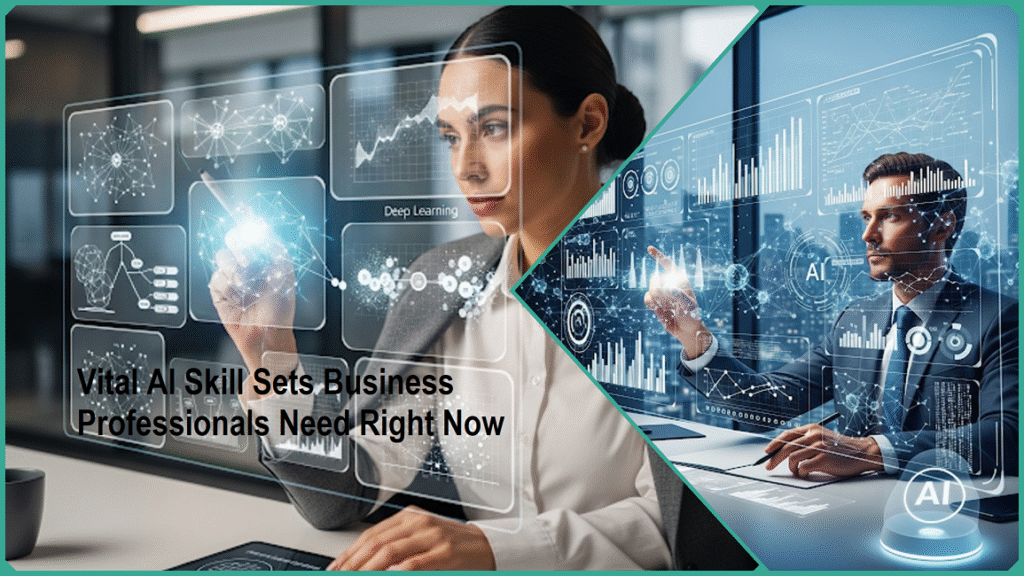5 Vital AI Skill Sets Business Professionals Need Right Now
Estimated reading time: 18 minutes
The era of artificial intelligence (AI) is no longer something to anticipate in the distant future—it has arrived and is profoundly reshaping the way businesses function and how individuals develop their careers. If you are a business professional—whether you find yourself as a mid-career manager navigating complex challenges, an aspiring leader eager to make an impact, a small business owner striving to grow your enterprise, a recent graduate stepping into the workforce, or someone working in learning and development—you have most likely asked yourself the crucial question:
What specific AI skill sets are most essential and in high demand for me to focus on acquiring right now in today’s rapidly evolving technological landscape?

Let’s take a detailed look at exactly which AI skill sets are crucial for thriving and succeeding in today’s fast-evolving business world, why these skills matter so much in the current landscape, and how you can begin developing and honing them effectively, regardless of your technical background or prior experience.
Why AI Skill Sets Matter in Business
AI skill sets are essential in today’s business landscape because artificial intelligence is revolutionizing how work is done and how companies compete. McKinsey’s 2025 workplace report, Superagency in the Workplace: Empowering People to Unlock AI’s Full Potential at Work, highlights that AI’s impact on productivity and economic value rivals historic technological breakthroughs like the steam engine in both scale and significance. This transformation is reshaping organizational dynamics and business strategies across the globe.
Here’s why having AI skill sets is absolutely crucial and increasingly important in today’s rapidly evolving business landscape:
- Efficiency through Automation: AI automates routine and time-consuming tasks, freeing professionals to focus on strategic, creative, and high-impact work. For example, AI bots can now summarize customer service interactions, advise on next steps, and even autonomously carry out follow-up actions—such as processing payments or verifying fraud. This automation of end-to-end workflows dramatically accelerates operations and reduces human error.
- Smarter Decision-Making with Data Insights: The rise of powerful AI, including large language models (LLMs) and agentic AI (autonomous AI agents), equips businesses to extract actionable insights from massive datasets. These AI systems can reason, plan, and predict, enabling decision-makers to act with confidence and agility. Professionals skilled in interpreting AI outputs and integrating these insights into their workflows enhance organizational intelligence.
- Competitive Advantage via AI Adoption: McKinsey highlights that while nearly all companies are investing in AI, only 1% have reached a level of “maturity” where AI is fully integrated into business processes and drives substantial outcomes. Those organizations—and professionals—that master AI collaboration are outpacing competitors, unlocking innovations, and driving new growth opportunities.
- Career Security for Business Professionals: As AI takes over repetitive and analytical tasks, professionals who develop AI fluency and the ability to collaborate effectively with AI tools ensure their future relevance. McKinsey’s report highlights that employees are generally more prepared for AI adoption than leaders anticipate. Embracing AI skill sets mitigates risks of obsolescence and opens pathways to new roles augmented by AI technologies.
- Collaboration Between Humans and AI: AI agents today are not mere tools but digital collaborators capable of autonomous actions that integrate with human workflows. Businesses worldwide are deploying AI to act alongside employees, creating “superagency”—a human-AI partnership that multiplies productivity and creativity. This cohabitation requires skills focused on judgment, trust-building, and ethical governance of AI systems.
In Summary
AI skill sets empower business professionals to harness significant productivity gains, enabling them to streamline operations and achieve more efficient outcomes. These skills also help in making well-informed decisions by analyzing data effectively and anticipating market trends. Moreover, they drive competitive differentiation by allowing businesses to innovate and stay ahead in rapidly changing industries.
As the future of work continues to evolve, having confidence in navigating new challenges through AI becomes increasingly important. Developing core AI literacy along with the ability to integrate AI seamlessly into workflows is no longer optional—it has become an essential requirement for achieving sustained business success and ensuring long-term career longevity in today’s dynamic professional landscape.
Key AI Skill Sets for Business Professionals
Let’s break down the essential AI skills that every business professional must develop to thrive and succeed in today’s rapidly evolving, technology-driven workplace environment. This overview focuses specifically on the practical, non-technical abilities that are crucial for understanding, leveraging, and strategically applying AI tools and concepts effectively.
Mastering these skills not only supports individual career growth but also drives overall business success in an increasingly competitive market.
AI and Data Literacy
AI and data literacy mean understanding the basics of AI technology—how algorithms make decisions, what machine learning entails—and developing the ability to read, analyze, and interpret data outputs from AI-driven tools.
Why it matters: Professionals who “speak data” act as bridges between technical teams and business decision-makers. They can identify trends, challenge assumptions, and make smarter, data-backed decisions that drive business success. This foundational skill ensures you don’t just consume AI outputs blindly but understand their context and limitations.
- How to develop:
- Take free beginner-friendly courses like Google’s Machine Learning Crash Course or introductory AI courses on Coursera and edX.
- Regularly practice extracting meaningful insights from business intelligence dashboards like Tableau or Power BI.
- Follow case studies showing AI’s application in industries such as finance, marketing, and operations to understand practical uses.
Familiarity with Everyday AI Tools
This skill involves confidently and effectively using a wide range of AI-embedded business tools, including project management software, content creation platforms, comprehensive analytics suites, customer support chatbots, and various basic automation tools.
Mastering these tools enables professionals to streamline workflows, enhance productivity, and leverage artificial intelligence to optimize business operations across multiple departments and functions.
Why it matters: AI now underpins many popular software applications—Microsoft Office, Salesforce CRM, Google Workspace, and more. Knowing how to harness AI features and prompt such tools effectively boosts your productivity and credibility at work.
- How to develop:
- Experiment hands-on with AI tools like ChatGPT for content generation, Jasper for marketing copy, Canva’s Magic Design for visuals, and AI-driven CRMs for customer insights.
- Use AI analytics capabilities to run data reports and learn how to interpret performance metrics.
- Select a repetitive daily task—such as answering common emails or summarizing meetings—and automate it using AI tools.
Prompt Engineering & Workflow Integration
Prompt engineering is the specialized skill of designing and crafting clear, precise, and highly context-rich instructions that effectively guide AI models toward generating the desired outputs. This involves understanding the nuances of language and the capabilities of AI systems to ensure that the instructions produce accurate and relevant results consistently.
Workflow integration, on the other hand, refers to the strategic embedding of AI technologies into everyday business processes and operations, with the primary goal of enhancing both the speed and accuracy of these tasks. By incorporating AI seamlessly into workflows, organizations can streamline their activities, reduce manual effort, and achieve higher efficiency and productivity across various functions.
Why it matters: Prompt engineering is emerging as a vital “new admin skill” for anyone who interacts with generative AI. Mastering it can massively amplify what you achieve with AI. Integrating AI into workflows is critical for managers and team leads aiming to boost team efficiency and foster change management.
- How to develop:
- Practice writing and testing different AI prompts in tools like ChatGPT or Gemini to see how varying instructions impact the output quality.
- Map out your team’s day-to-day tasks and explore automating parts or whole workflows using AI platforms.
- Lead team workshops or discussions to collect ideas on tasks that AI might help with and plan implementation.
Critical Thinking, Ethics, and AI Judgment
This skill involves the ability to carefully discern and evaluate the strengths and limitations inherent in artificial intelligence systems, understanding where AI excels and where it may fall short. It also requires recognizing and identifying potential biases present in the data used to train these systems, which can impact the fairness and accuracy of AI outcomes.
Additionally, this skill includes ensuring that all AI applications comply with relevant privacy regulations and standards to protect sensitive information. Equally important is the application of thoughtful human judgment when interpreting and acting on AI-driven recommendations, balancing automated insights with ethical and practical considerations.
Why it matters: As AI becomes more influential in decision-making, business leaders and professionals need to serve as trusted voices who ensure AI is used fairly and responsibly. Ethical use of AI builds stakeholder trust and prevents costly missteps or reputational damage.
- How to develop:
- Stay informed about current debates in AI ethics through articles, webinars, and expert talks.
- Analyze real-life business cases where AI decisions caused controversy or ethical dilemmas to understand risks and mitigation strategies.
- Participate in company or community-led workshops focused on responsible AI governance.
Strategic AI Leadership
Strategic AI leadership involves leveraging valuable insights derived from artificial intelligence to shape and inform major, big-picture decisions. It requires the ability to thoroughly assess potential risks and opportunities associated with AI technologies, while effectively guiding and supporting teams as they navigate through significant technological changes.
This leadership approach emphasizes not only technical expertise but also the importance of balancing empathy and maintaining a strong focus on human-centric management practices throughout the entire process.
Why it matters: AI-savvy leaders are essential to successfully leveraging AI’s promise in organizations. They interpret AI data in context, steer innovation responsibly, and create environments where their teams can thrive alongside AI.
- How to develop:
- Engage in leadership development programs that include AI modules or simulations.
- Use case studies to practice strategic AI adoption and risk management.
- Foster emotional intelligence and change management skills to lead diverse teams through AI integration.
Bonus Skill: Adaptability and Continuous Learning
With the rapid and continuous evolution of AI technologies, it has become essential to remain adaptable and dedicated to lifelong learning throughout one’s career. Professionals who actively cultivate a strong sense of curiosity and maintain a growth mindset are far better positioned to effectively respond to the ever-changing landscape of new tools, emerging roles, and diverse opportunities that AI consistently creates and introduces.
These practical, non-technical AI skills create a strong foundation that enables business professionals not only to survive but to thrive in an increasingly AI-powered workplace environment truly. They equip you with the knowledge and confidence to make savvy, informed decisions, effectively harness AI tools in your daily tasks, lead innovation initiatives responsibly and ethically, and ultimately future-proof your career against the rapid advances in artificial intelligence technologies.
AI Skill Sets for Different Business Roles
Here’s a clear and detailed breakdown of how the most important AI skill sets are applied across various business roles, accompanied by practical examples that demonstrate their significant real-world impact and benefits in everyday business operations:
| Audience | Core AI Skill Sets | Example in Action |
|---|---|---|
| Mid-Career Professionals | Data literacy, AI tools, critical thinking | Automating departmental reports to improve workflow |
| Aspiring Leaders/Managers | Strategic AI use, prompt engineering, ethical leadership | Using predictive analytics for market expansion decisions |
| Small Business Owners | AI-powered marketing, automation, and data-driven decisions | Leveraging free AI tools for customer segmentation and targeted email campaigns |
| Recent Graduates/Young Pros | AI tool fluency, adaptability, data basics, and ethical awareness | Working with project teams to automate client proposals and analyze campaign data |
| L&D Professionals | AI literacy, strategic thinking, needs analysis | Designing AI-powered training programs to upskill staff |
Role-Specific Insights and Examples
Mid-Career Professionals
- Primary Needs: Mastering the use of data dashboards, AI-driven reporting, and critical analysis.
- Impact: By automating regular reporting with AI tools, professionals save time and produce deeper insights, enabling better planning and more agile responses to changes in performance.
Aspiring Leaders and Managers
- Primary Needs: Strategic application of AI, understanding advanced analytics, and navigating ethical considerations.
- Impact: Leaders employ predictive models to spot new markets, optimize resources, and foster responsible AI adoption throughout their teams—key for advancing in the age of AI.
Small Business Owners
- Primary Needs: Utilizing user-friendly AI for marketing, customer service, and business process automation.
- Impact: Owners who tap into free or low-cost AI platforms can automatically sort customer leads, personalize outreach, or automate inventory management—competing effectively with bigger firms.
Recent Graduates and Young Professionals
- Primary Needs: Comfortable experimenting with AI apps and tools, practicing ethical decision-making, interpreting data basics, and maintaining a learning mindset.
- Impact: By using AI to optimize team processes (e.g., automating proposal creation), they stand out and quickly contribute value—even early in their careers.
L&D (Learning and Development) Professionals
- Primary Needs: Designing learning experiences and adoption strategies for AI-powered upskilling.
- Impact: L&D leaders who embed AI literacy into training help organizations adapt faster and close emerging skills gaps, directly impacting business agility and innovation.
Regardless of your role within an organization, dedicating time to develop AI skills tailored to your responsibilities enables you to automate repetitive tasks, uncover strategic insights, and confidently assume leadership or contribute effectively in today’s fast-paced, technology-driven business world. If you would like detailed case studies or specialized resources organized by role, please feel free to reach out!
Current Trends and Developments
Current trends and recent developments highlight the dynamic ways in which AI skill sets are continuously evolving, significantly shaping and influencing the landscape of business operations and strategies in the year 2025 and beyond:
Generative AI Booms
- Generative AI (GenAI) skills have skyrocketed with an 866% year-over-year growth in enrollments among business learners, according to Coursera’s 2025 Job Skills Report.
- Businesses increasingly invest in GenAI to innovate content creation, design automation, prototyping, and problem-solving.
- GenAI is projected to become one of the top three priorities for corporate training by 2027, reflecting its growing strategic importance.
AI-Augmented Leadership
- Leadership development programs now focus on balancing AI-driven data insights with human judgment and emotional intelligence.
- Leaders are trained to operationalize AI strategically across their organizations while managing ethical considerations and change.
In-Demand AI Roles
- Roles like AI Product Manager, Generative AI Specialist, and Data Scientist are rapidly rising in demand due to expanding AI integration across sectors.
- Employers seek professionals who not only understand AI technology but can translate it into real-world business applications.
Small Businesses Get a Boost
- Free or affordable AI tools democratize access, empowering small and medium businesses (SMBs) to automate marketing, customer segmentation, and processes without large data science teams.
- This levels the playing field, letting SMBs compete efficiently alongside larger players.
Corporate Upskilling on AI
- Learning and Development (L&D) teams emphasize AI literacy and workflow integration as cornerstone themes for employee upskilling in 2025.
- Organizations are investing heavily in AI education to scale workforce readiness and productivity gains.
These emerging trends highlight a significant and profound shift occurring across the entire industry toward the integration and embedding of AI skills within every business role. This ranges from entry-level positions up to executive leadership roles.
This widespread adoption and emphasis on AI capabilities are driving substantial advancements in innovation, greatly enhancing operational efficiency, and creating strong competitive advantages that help organizations stand out in a crowded marketplace.
Real-World Example
Here are several real-world examples that clearly illustrate the transformative and far-reaching impact of AI skill sets for business professionals operating across a wide range of scales and industries:
Mid-Sized Marketing Firm Success Story
A mid-sized marketing firm was confronted with increasing competition and significantly tighter budgets. Rather than opting to hire new specialists, they made a strategic decision to invest in upskilling their existing staff by training them extensively on AI-driven analytics and advanced content automation tools. This approach allowed them to maximize their current workforce’s potential while adapting to the evolving demands of the market.
- Results
- 30% reduction in campaign preparation time due to automation of data analysis, audience segmentation, and content generation.
- A 20% increase in lead conversion rates was achieved by leveraging predictive analytics to target the most promising customers with personalized campaigns.
- Time savings allowed marketing teams to focus more on strategy and creative work rather than routine tasks.
This example reflects broader and more significant industry trends, demonstrating how AI marketing tools consistently help firms optimize their budgets more efficiently, increase the level of personalization offered to customers, and substantially speed up various operational processes.
Small Business Owner Leveraging Free AI Tools
A small business owner took advantage of various free AI tools to efficiently automate multiple routine tasks such as customer follow-ups, invoice processing, and basic bookkeeping—tasks that had previously consumed several hours of their time every single day. By implementing these AI-driven solutions, the owner was able to significantly reduce manual workload and improve overall business productivity.
- Results
- Significant time was freed up, which was redirected toward building stronger, personalized client relationships and innovating product offerings.
- The automation of routine operational tasks helped the small business compete with larger companies that had access to expensive data science teams.
- Use of AI chatbots and email automation improved customer responsiveness and retention without hiring additional staff.
Broader AI Marketing Impact Highlighted by Case Studies
- Amazon’s advanced AI-powered recommendation system is responsible for generating approximately 35% of the company’s total sales, significantly enhancing the overall customer experience. By delivering real-time, highly personalized product suggestions tailored to individual user preferences and browsing behavior, this intelligent system helps customers discover relevant items quickly and efficiently.
- Netflix employs sophisticated recommendation engines to personalize and tailor the content experience for each user, ensuring that the suggestions are highly relevant and engaging. Remarkably, nearly 80% of all content viewed on the platform is influenced and guided by these advanced artificial intelligence algorithms, highlighting the significant role AI plays in shaping user preferences and viewing habits.
- Companies that adopt AI-driven marketing solutions typically experience a substantial 25% reduction in their overall customer acquisition costs, along with notable and significant improvements in their ability to convert leads into paying customers. This combination of cost savings and enhanced conversion rates often leads to stronger business growth and improved marketing efficiency.
These cases highlight how gaining expertise in various AI skill sets—from advanced analytics and intelligent automation to enhanced customer interaction techniques—can significantly drive meaningful and measurable business results. This is achievable even in organizations that do not have the advantage of large, specialized technical teams or extensive IT resources.
FAQs
Do I need to know how to code to master AI skill sets?
While understanding some programming basics can be helpful, most essential AI skills for business professionals focus on how to use, interpret, and integrate AI tools in decision-making and workflows—not on building AI models from scratch. Business users thrive by combining AI literacy with critical thinking and ethical judgment rather than deep coding.
What AI tools should business professionals learn first?
Begin with user-friendly and widely adopted tools that provide immediate and tangible value, such as:
- ChatGPT or Gemini for content creation, ideation, and communication.
- Tableau or Power BI for data visualization and business intelligence.
- AI features are embedded in commonly used software like Microsoft Office, Google Workspace, or Salesforce CRM for automation and analytics.
How can I keep my skills relevant as AI keeps evolving?
The key to success lies in adaptability, which is achieved through a commitment to continuous learning and ongoing personal and professional development.
- Block regular “learning hours” to explore new AI tools and updates.
- Follow reputable news sources and industry experts on AI trends.
- Join professional communities or forums for peer learning.
- Seek ongoing cross-training opportunities within your organization to broaden and refresh your AI capabilities.
Is AI going to replace my job?
Not if you upskill. AI will automate repetitive or lower-skill tasks, but professionals who learn to collaborate effectively with AI tools and apply human judgment, ethics, and creativity will be in higher demand. These complementary skills are critical to managing and leveraging AI responsibly.
Where can I learn these AI skill sets affordably?
There are numerous free or low-cost resources available that can help individuals build and enhance their AI skills effectively:
- Coursera and edX offer beginner-friendly AI courses geared for business applications.
- Google’s Machine Learning Crash Course is an excellent starting point.
- YouTube tutorials and community forums focused on tools like ChatGPT, Tableau, or Power BI provide practical guidance.
- Many business software platforms also have free training modules on their integrated AI features.
These frequently asked questions provide comprehensive and practical guidance designed to help professionals confidently begin and successfully sustain their journey of learning and mastering artificial intelligence. They cover essential tips and strategies to support ongoing growth and development in the rapidly evolving field of AI.
In Conclusion
AI skill sets are no longer optional but essential for any business professional aiming to stay competitive in today’s fast-evolving landscape. The future favors those who combine data literacy, mastery of everyday AI tools, critical thinking, and adaptive leadership to drive innovation and strategic growth.
Whether you’re climbing the corporate ladder, leading a team, or steering a business, continuous learning is your greatest asset. Don’t be daunted by technical jargon—these vital skills are accessible and achievable with consistent effort.
Here’s a detailed guide on how to begin future-proofing your career starting today:
- Enroll in a free AI course tailored for business professionals to build foundational knowledge.
- Identify one repetitive task in your workflow and automate it using a simple AI tool like ChatGPT or an AI-enabled CRM.
- Seek out peers, mentors, or communities already leveraging AI and learn firsthand from their experiences.
Remember, AI in business isn’t about replacing humans; it’s about empowering people to achieve more, faster, and smarter by working alongside intelligent technology. Embrace the AI journey now, and position yourself as a forward-thinking leader in the age of artificial intelligence.
Discover more from Skill to Grow
Subscribe to get the latest posts sent to your email.






